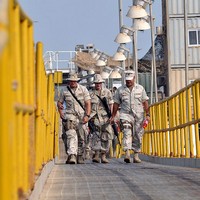For the first time in several decades, Iraq reclaimed its place as the second-largest OPEC oil producer in July. Iraq produced more than 3 million barrels per day (bpd) over the month, surpassing Iran, whose production fell to 2.9 million bpd. The development resulted from a combination of Iraq’s gradually increasing oil output and Iran’s decreasing production due to the growing impact of international sanctions on Iran’s energy production sector.
During the past five years, Iran’s oil production has decreased by about 1 million bpd due to various multinational and unilateral sanctions on its commercial activities. Meanwhile, Iraq’s output has risen by almost the same amount thanks to improvements in its security and infrastructure, as well as to increased foreign investment.
The oil sector provides more than 90 percent of the Iraqi government’s revenue and 80 percent of Iraq’s foreign exchange earnings. But while most of the country’s key interest groups accept the need to create new legal and policy guidelines to facilitate development of the country’s energy resources, they differ in their proposed solutions on a number of key issues. These include the proper roles and powers of federal and regional authorities in regulating oil and gas development; the terms and extent of potential foreign participation in the oil and gas sectors; and proposed formulas and mechanisms for equitably sharing oil and gas revenue.

